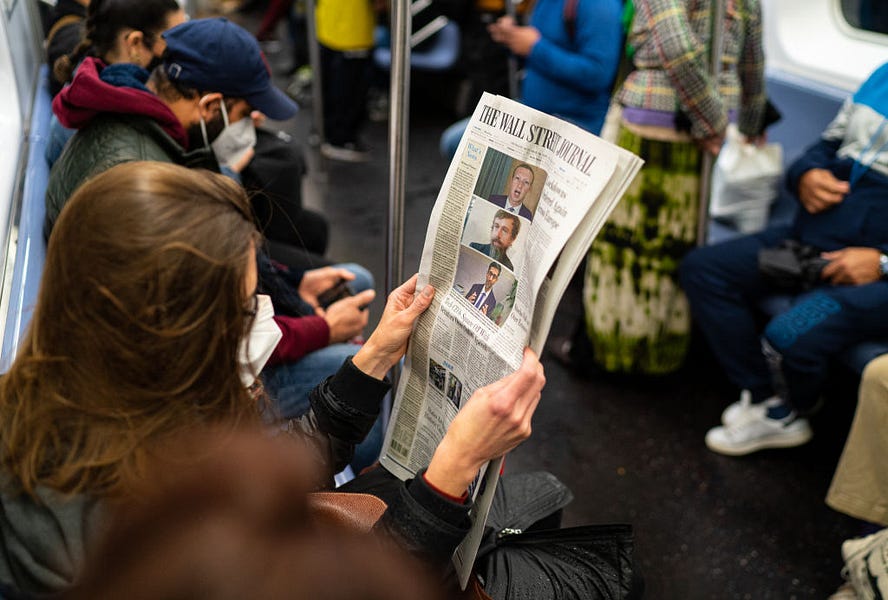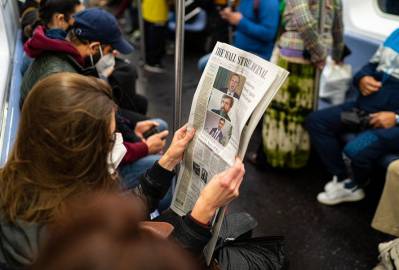One of the missing ingredients that’s keeping the American system from functioning well is sufficient local news consumption. This is no revelation to anyone who has watched with even passing interest as the American news media consolidated and nationalized over the past two decades. The deficiency is indeed so obvious there is growing bipartisan agreement on the existence of the problem and a raft of proposals in Congress to address it. But it certainly bears reminding ourselves of the reasons why we need Americans to be better informed on local issues.
We live in a union of states, not a monolithic nation state. Our system is designed for disputes to be resolved and policies to be introduced at the most local level possible. If the town council can’t handle it, the county commission may have to come in. The state may eventually have to get involved if the costs or consequences become too great. Only the biggest or most confounding problems, though, should make it to the federal government. But that’s not what one would discern from looking at Americans’ media consumption. It is very easy to get national news—almost impossible to avoid, really—and very hard to find robust local news. The clear message to Americans is that the remote national capital is more important to their lives than their statehouse or city hall, when the opposite is—or at least should be—true.
The American doctrine of political subsidiarity means that the national government is a subsidiary of the state governments, which are themselves subsidiaries of county or other local governments. The flow is mostly supposed to go from the bottom to the top, not the top down. Consider the decades of savage cultural conflict that followed the Supreme Court decision in the case of Roe v. Wade. The court shifted the polarity on the flow of power when it snatched the issue from the states before a consensus—really many regional consensuses—could be reached. Congress couldn’t enact a law pertaining to abortion that would please both Texas and California so how the heck were Harry Blackmun and six of his fellow justices going to sort it out themselves?
As the Roe decision is finally unraveling after 40 turbulent years—turbulence that warped the judicial selection process and expanded still more the power of the presidency—we look back on a clear case of what goes wrong when the national government forgets to be a subsidiary of the states. States hold a variety of policies on similarly fraught issues: the death penalty, the age of consent, assisted suicide, etc. We seldom if ever have to discuss those issues because they are being resolved by leaders in close proximity to their constituents. Californians might not like Texas’ rules and vice versa, but that causes very little aggravation compared to what we have now with Roe. The status quo on abortion and several other issues is that the blue states and the red states compete for national power to try to make the whole country live like either Californians or Texans. The result is an overpowered but still ineffectual federal government and an increasingly frustrated and excitable electorate. Much of what passes for political and governmental news these days is just about amplifying that frustration and intensifying the cycle of federal bloat and bust.
Diffused power is good because it acts as a check on the tyrannical tendency of highly centralized authority, but it is also good because it allows policies to be administered in the way best suited to individuals. In a nation of 330 million souls, nearly 4 million square miles, and a $21 trillion economy, the belief that there could be more than a handful of one-size-fits-all national solutions must spring from naivety and/or a desire for power. A big part of what makes America great is that we have lots of different pluribuses in our unum. In homogenous societies like Japan, if the mainstream fails, there isn’t another ethnic, economic, geographic, or cultural group to move the nation along. Monocultures are risky in societies in the same way they are in agriculture. So why isn’t that reflected in the news and information readily available to Americans? There are lots of reasons, but market opportunity explains a lot. Having 100 employees for a local newspaper or television station is expensive and has, by definition, a limited area in which to seek profits. The same 100 salaries could produce national coverage that would have far greater possibilities for return on investment.
We don’t know if more robust local news coverage would reverse America’s slide toward centralized power and populist rage politics, but we certainly know weak local coverage has both contributed to and been driven by that slide. And certainly, if we saw local coverage suddenly surging it would be cheered nearly unanimously. But what about engineering that outcome?
The $2.2 trillion social welfare spending package passed by the House and now being sniffed at by the Senate includes $1.7 billion to subsidize local news coverage over the next five years. Newspapers, local TV and radio stations, and websites that focus on local news would be eligible for $25,000 for each journalist they employ in the first year and $15,000 in each of the next four. Leaving aside the dubious assumption about how many of the subsidized positions would remain when the money stopped flowing, such a program would certainly result in an increase in local news coverage. But, again, is that a good thing?
If the problem is that Americans aren’t consuming enough local news, it may be more of a problem of demand rather than supply. More Americans may prefer the thrum of frustration over distant outrages and inept federal responses to the debates over school consolidation, sewer bonds, and the state prison system. If that’s the case—or even just mostly the case—subsidizing unpopular kinds of local coverage would make things worse, not better. Worse still, such payments would make the government a patron of the journalists covering the government’s leaders. That’s the way to create the system in some other countries in which some outlets are “official” and others are not. If “official” status comes with free money, publishers and broadcasters would line up for state sanctioning.
There are good ideas for ways to make the local news business more attractive that relate to ownership and antitrust regulations, among other things. But direct subsidy is wrong since it would both distort the market and breed dependence. If the resurgence of local news is not from the bottom up itself, it will be no good for helping change our top-down political problem.







Please note that we at The Dispatch hold ourselves, our work, and our commenters to a higher standard than other places on the internet. We welcome comments that foster genuine debate or discussion—including comments critical of us or our work—but responses that include ad hominem attacks on fellow Dispatch members or are intended to stoke fear and anger may be moderated.
With your membership, you only have the ability to comment on The Morning Dispatch articles. Consider upgrading to join the conversation everywhere.